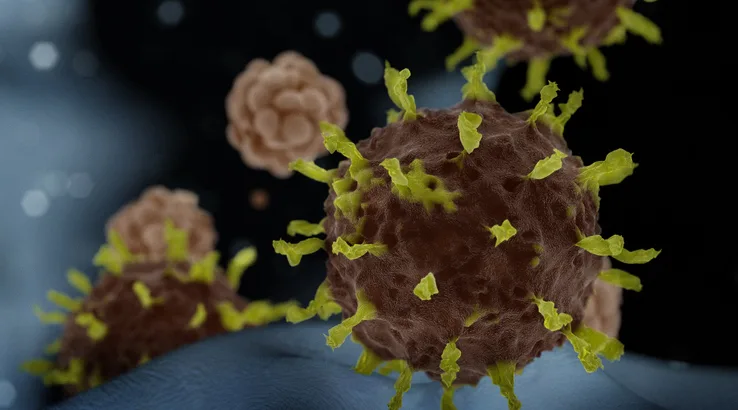Coronavirus: Common scams to watch out for

As COVID-19 (coronavirus) continues to spread around the globe, scammers are cashing in on public fears around the pandemic.
Widespread anxiety, supply shortages and a surge of misinformation have created the perfect storm for scammers to capitalise on coronavirus. While the Internet is a critical tool for communication and information during this time, it also provides a platform for scammers to prey on people at their most susceptible.
From malicious emails to fake medical cures, Scamwatch figures show that Aussies have lost over $3.3 million to cybercriminals since the pandemic was declared in March 2020, with 4,160 scam reports lodged by July that year.
Finder research also shows that approximately 47% of Australians – equivalent to 9 million people – have received a fraudulent text or phone call since the pandemic began.
Of those who have been contacted by a scammer, almost a third (32%) failed to report it– this is nearly three times higher than the 12% of recipients who flagged the issue with authorities.
With the virus showing no sign of slowing down, it's important to arm yourself with the facts to prevent falling victim to a scam.
Finder has compiled a list of the common scams to watch out for, along with tips for protecting yourself online.
Common coronavirus scams
Puppy scams
Thousands of Aussies have been seeking out furry companions during social isolation, but this has lead to an increase in puppy scams. According to the ACCC, Aussies have lost over $300,000 to puppy scams this year alone, with cases in April almost five times higher than the average.
Scammers have been creating fake websites or online ads pretending to sell sought-after dog breeds and are taking advantage of the fact that you can't travel to inspect the puppy in person. These scammers will usually ask for upfront payments via money transfer, after which they will cease all contact.
The safest option is to buy or adopt a pet you can meet in person. If you can't do that during the current restrictions, you may need to hold off the search.
Superannuation scams
It's been reported that scammers are cold-calling Australians and sending unsolicited emails and text messages about accessing their super early. The ATO and your super fund will never contact you out of the blue about accessing your super early. Don't give your personal super details out and don't click on any links claiming to be taking you to the myGov site or your super fund's site.
Phishing emails
The World Health Organisation (WHO) has warned against fake emails attempting to steal personal information and money. Criminals disguised as WHO officials have been targeting the public with emails that ask for sensitive information like account passwords and usernames. Victims have been tricked into clicking malicious links or opening malicious attachments.
The WHO has confirmed that it will never ask for personal information or ask you to visit a link outside of www.who.int. Read the organisation's full cybersecurity statement here.
Other reported phishing scams include "doctors" claiming to know about a vaccine, offers for a COVID-19 tax rebate and requests for donations to help fund vaccine research.
Phishing text messages
The Australian Cyber Security Centre (ACSC) has warned of coronavirus-themed phishing scams being sent via text message. The texts appear to come from 'GOV' and include a link to find out 'when to get tested in your geographical area' for COVID-19.
ACSC has confirmed that this link is malicious and if clicked on, may install harmful software onto your device designed to steal your personal information.
Fake vaccinations and medical treatment
The WHO has confirmed that there is no known cure for coronavirus at this stage. Current treatments are based on the type of care given for influenza and other respiratory illnesses. With this in mind, be wary of websites or emails offering vaccines, pills or medication claiming to treat or cure the disease.
Fake medical advice
Coronavirus "cures" or prevention myths have also been circulating on social media and the Internet. These include gargling bleach, ingesting "drinkable silver" or drinking water every 15 minutes to push the virus into your stomach where the stomach acid will kill the bacteria. Celebrity-endorsed "virus protection guides" have also been promoted online, despite their authors having no medical experience or training.
Remember, this is a new virus that we haven't seen before. This means articles or emails claiming that certain supplements or products can "cure" or prevent the disease are fake. The most reliable health information comes from sources like the government, the WHO and Centres for Disease Control and Prevention (CDC). Steer clear of celebrity endorsements or fake websites.
Counterfeit face masks
Worldwide demand for protective facemasks has led to a global shortage. As a result, there's been a surge in counterfeit face masks available on Amazon, Facebook and Craigslist. Cybercriminals on the dark web have also been selling fake masks to exploit the shortage.
These counterfeit masks haven't been approved by the CDC and offer little to no protection against preventing the spread of germs. Top-selling face mask companies have warned against counterfeit masks and recommend that consumers purchase from a reputable brand to ensure they're protected. The CDC has provided a guide to recognising counterfeit masks here.
Price gouging on health and sanitation products
Increased demand for products like toilet paper, hand sanitiser and facemasks has led to widespread panic buying and stock shortages. Some eBay and Amazon sellers are capitalising on the surge in consumer demand, with health products like hand sanitiser selling for as much as $400 online.
Amazon has cracked down on price gouging in the US by restricting the types of accounts that can sell sanitation products. The company has also removed millions of products making fake coronavirus claims and banned sellers that have jacked up their prices for health items. Both Amazon Australia and eBay Australia are also working towards removing any listings guilty of price gouging.
Coronavirus trackers
Coronavirus tracking dashboards have been promoted online as a way to keep up to date with the spread of the virus. But an investigation by Reason Security found that some of these coronavirus maps contain harmful malware (AZORult). Downloading this software onto your computer can give hackers access to your personal information. This includes your browser history, social media account logins and bank account or cryptocurrency information.
While it's wise to keep informed, you should be relying on respected media outlets or government sites for information.
How to spot fake facts
Counterfeit products and cyberscams aren't the only things to watch out for. Fake news should also be on your radar. Because COVID-19 is a new virus, health authorities have been reluctant to release new information unless they're assured it's correct. But this has fuelled the spread of fake news, conspiracies and misinformation online, primarily on forums like Reddit and Twitter. These sites may spread false information around infected suburbs and areas to avoid or covered up cures.
Below are some tips for weeding out fact from fiction:
- Check your sources. How legitimate is this information? Has it come from an official government website, a credible authority or a random website? You should rely on respected news outlets and government websites for the most up-to-date information on coronavirus. If you access information on public forums like Reddit, keep an eye out for tags like "Rumours-unconfirmed source". Reddit has recently installed these measures to help users distinguish between real information and fake conspiracies.
- Check the author. Are they a well-known journalist or medical spokesperson? Has their work been published across respected media outlets or publications? A quick online search will give a good indication of their public presence and how valid their claims are.
- Check the images. Does the story include "exclusive" images? If so, it's worth doing a Google reverse search to check their legitimacy and ensure they haven't been published elsewhere,
- Does this story support what the mainstream media is saying? Are other media outlets circulating this information? Does it claim to be breaking news? If not, it has likely been rejected by media outlets or is a bogus piece of information.
- Does the source claim to have a cure? If so, it is probably fake.
Quick tips for protecting yourself from online scams
- Don't open attachments from suspicious senders. Don't click on links from sources you don't know.
- Visit the World Health Organisation or your country's Centre for Disease Control website for the latest information. Don't rely on email. There are also several coronavirus hotlines you can call.
- Before purchasing from an online business, check for a valid URL and look up the ABN to ensure its validity.
- Make sure all you update all your current software. It can be worth updating or changing your passwords to be extra careful.
- Steer clear of products that claim to treat or prevent coronavirus, and ignore any claims about a vaccine.
- Do your homework before making a donation. If someone is pressuring you to donate via cash, a gift card or money wire, don't do it.
- Follow @Scamwatch_gov_au to keep up to date with the latest coronavirus scams.
- Download the Government's official Coronavirus Australia app to keep up to date with the latest coronavirus information
- If you have fallen victim to online card fraud, contact your bank or card issuer immediately.
We updated this article on 16 September 2020 with new Finder and ACCC data.
Picture: GettyImages
Ask a question

